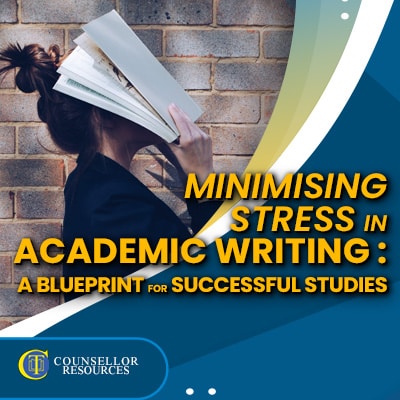In this lecture, counsellor and trainer Emma Chapman aims to help you understand what is required to pass academic writing assignments in counselling training. After listening to her presentation, you will be able to:
- identify what an assignment is asking you to do
- understand how to structure and plan an assignment to avoid feelings of overwhelm
- explain how to develop an academic argument
- understand how to use references and citations
- recognise the importance of editing and proofreading.

Understanding what you are being asked to do is central to successful academic writing, and Emma begins by showing you how to identify this accurately and consistently.
Watch this Lecture + Hundreds More
+ Assignment Guidance & Study Support for Counselling Students
- Academic Lecture Library - Lectures that cover key theory, skills and professional development linked to your counselling study.
- Assignment Guidance - Complete assignment exemplars and portfolios of work that have been passed by both tutors and awarding bodies.
- Theory Decoded, Skills Mastery and More - Counselling theories and skills are broken down into easy-to-understand ‘chunks’, with clear examples to guide you.
Once you have clarified the task, you’ll then need to look at structure and planning – again, Emma provides tips based on her experience of academic writing to help you create a sound structure and plan for your assignment.
Gathering supporting evidence through reading the relevant literature can feel a daunting task, but can be simplified through good technique, which you will also learn about here.
While some counselling assignments are theoretical, another key type of written work you will be expected to produce as a counselling student is the personal development assignment. This requires a slightly different approach, and Emma explains how to go about producing a piece of work that demonstrates your growing self-awareness.
Last but not least, Emma provides guidance on the finishing touches to producing your pass-worthy assignment:
- citations
- references
- editing
- proofreading.
A final summary reminds you of what to check for before submitting your assignment – all helping you achieve academic success without (too much) stress!
About the Lecture Presenter

Emma Chapman is a counsellor and trainer working in private counselling practice in Cheshire. In her Northwich office, she works with adults, young people and couples.
Emma believes that having good mental health is the key to having a fulfilled and happy life. As a passionate advocate for mental health, Emma also delivers mental health training to a variety of audiences across the North West of England.
Emma is a qualified teacher who came to counselling later on in life after 15 years of working in public sector and charity roles. During this time she worked with vulnerable children, adults and families in teaching, family support, safeguarding and pastoral roles.
After so many years working with children and families who often struggled to manage day to day life, Emma began to observe that poor mental health and trauma played a huge part in keeping people stuck in damaging patterns of behaviour.
This conclusion led her to further training in mental health, and she started her counsellor training in 2014 at Mid-Cheshire College studying part-time. In 2018 she completed an MA in Clinical Counselling at Chester University.
Emma has experience working in an NHS IAPT setting but decided to work privately in order to work with her clients more creatively.
After a short spell teaching counselling at a local college, Emma continued to put her teaching skills to use and further develop some training packages for fellow counsellors, educational settings and businesses.
As a mother of two children, Emma struggled with her own mental health after becoming a mother. In 2019 she had her research into maternal mental health published in the journal of Crisis, Illness and Loss. She now specialises in working with mothers experiencing perinatal mental health difficulties in her private practice.
Following some time working at a charity dedicated to the prevention of suicide it became clear to Emma that there was little therapeutic support for those experiencing suicidal ideation.
In her private practice she also works with people who are experiencing Suicidal Thoughts and delivers suicide awareness training to counsellors and other organisations across the North West.
Free Handout Download
Minimising Stress in Academic Writing - lecture overview